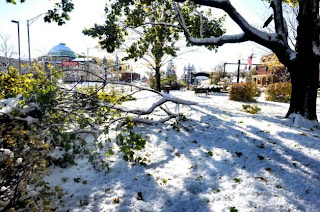There is a great article by Elizabeth Dwoskin in the November 20th issue of Bloomberg Businessweek titled "Why American's won't do dirty jobs." One of best American assets in this country is our agricultural industry. In many states, if it were not for beef (Montana), oranges (Florida), grapes (California), and corn (Midwest) our economy and our way of life would surely not exist as we know it. We are a well-fed nation because of our adoration of food and agriculture provides a very necessary economic and commercial engine for that love. Yet the problem: there is no one willing to harvest the crops.
Ironic isn't it?! Millions of people are out of work but are too snobby to take on the work of immigrants who come to this country to work tirelessly for near minimum wage jobs (or per piece or bucket or bushel)! But that is where the problem lies is the pay is not enough and the hours are horrendous requiring back breaking work that many of us went to college to avoid. After working for 12 years in worker's compensation and counseling legions of injured workers suffering from debilitating injuries due to physical labor (lineman, loggers, certified nursing assistant, truck drivers), I always touted the benefits of a good education - a desk job! Now I'm not so sure that we have been sending the right message. Instead, perhaps the message should be changed: work hard while you can while going to college to avoid having to do it forever!
BRAINSTORM: (Likely many won't approve because so few care to get their hands dirty but I think this could solve many problems and create a sustainable education system and agricultural industry - so bear with me as I elucidate). Harvest for Tuition! Yup - every student going to a public post-secondary institution can have their tuition waived if they put in 360 hours (6 days a week, 10 hours a day, for six weeks) of labor (per academic year) at a farm planting, maintaining, harvesting, and preparing fields. Okay, granted not everyone is physically capable of performing some of these duties but a majority are. Those who are not (and it's not because mommy said so) they can participate in other duties related to raising crops; forecasting crop futures (economics), assess value of crops and equipment (marketing/accounting), impact of weather (meteorology), pest (entomology), and other environmental factors (geology), tracking hours of the workers (human resources) and other aspects of the business of running a farm.
This would all be subsidized by the US government, students would then not need financial aid and those who participate will be able to utilize this experience in the class room as well as gain a better understanding and appreciation of a billion dollar industry and it's variety of crops, locations, politics, and power across America. It will be entirely voluntary thus eliminating the illegal immigrant issue. Those students who pass on this labor agreement will have to pay full tuition. In addition they will miss a sense of pride over calluses that ring their palms, a wicked farmer tan, and respect for hard work.
Insights and perspective on real every day management practices as it relates to a weird world!
Monday, November 28, 2011
Thursday, November 10, 2011
WM #15: "Bar Fight"
 |
| Snow in OCTOBER? |
I had an argument with woman I met in a bar in Mystic last night over the CL&P's post Winter Storm Arnold debacle. While sitting peacefully nursing a lovely Tanqueray martini with three olives, a couple entered the bar who were very gregarious and sociable. Not sure how the conversation started but we got to the topic of the power outage in western and northern Connecticut and everywhere else in between. Essentially the female half of the couple felt very vehemently everyone needs to give CL&P (Connecticut Light and Power) a break and make the best of the power outage by going out and buying generators. While I can appreciate this point of view being an outdoorsy kind a gal adapting to a couple days without power, what I took offense to was her assertion that CL&P as a business do not have to report to anyone about their business practices and how they deal with this type of situation. She argued, "They were ill-prepared for a big storm that shook our state back to the 19th century and was comparable to Katrina in it's damage!" Bull Shit!
 |
| Danbury, CT |
First of all, CL&P is a customer driven enterprise that remains always and forever obligated to the their 1.2 million customers who rely upon them for power that sustains businesses, safety, comfort, and light. For this reason they must inform and prepare customers accurately and honestly on delays and failures in restoring power - PERIOD!
Second, whenever I hear someone who drinks deeply of the corporate greed "kool-aide" it just pisses me off - thus - a "bar fight." I see it as an opportunity to educate and influence a more appropriate point of view - MINE! Okay maybe I'm a little self absorbed but hey - this is my blog and I'm weird - but not too weird cause someone agrees with me.
Senator Joe Courtney sent his insights and plan of action recently via an email. Due to the missed CL&P deadlines and poor communications, Courtney called upon a Congressional Delegation Investigation. YES! Let's hold those bastards accountable while they languish in their multimillion dollar homes protected by their fancy, schmancy stock portfolio and gold Bullions housed in a Swiss bank account.
You can read an interesting (and short) letter to the Chairman of the Federal Energy Regulatory Commission at the following link: http://courtney.house.gov/index.cfm?.sectionid=206§iontree=4,11,206&itemid=1035
Because I'm not one to pass up an opportunity to comment, I wrote the following to Mr. Courtney:
Mr. Courtney,
Thank you for your recent email regarding the current issues with CL&P. I am a professor of management at Eastern CT State University and often use organizational mishaps to discuss with my students on communications that have fallen short during a crisis (last year I discussed Toyota's accelerator issues and their poor response time to consumers and dealers).
With all that our country and state is confronted with economically, CL&P and it's leadership must be held accountable for their failed communication and clear disregard for importance of holistically responding to this type of crisis. No organization is an island!
I believe you are in a unique and hopefully pivotal spot to give them a clear understanding of the consequences of this situation. While I did not lose power after the winter storm, I did after Tropical Storm Irene. Many of your constituents recognized our dependence on electricity yet, unfortunetly, failed to recognize the "power" of a monopolistic entity such as CL&P. We can't switch power companies like we can banks.
I look forward to seeing and hearing about the outcome and repercussions laid upon CL&P for their abuse of power and lack of respect for their citizens, customers, workers, and other public agencies that had to pick up the slack! Thank you for your continued communication and diligence in overseeing our state and it's entities.
Lisa McRoberts
Tuesday, November 1, 2011
WM #14: Hiring Managers: What they are looking for?
My husband retired from the Navy two weeks ago. As of today he has been looking for work for two months. Because of the BS going on between the Democrats and Republicans over jobs and budgets, a job that would have secured my husbands dignity and overall view of post Navy life would have been rosy! But alas, the two jobs he interviewed for dried up because of the political pissing contest that is going on in D.C.
What I find amazing is a recent blog I read by Jason Seldon (My blog is Profersonal) about the current critical shortage of employees reported by some organizations. Now this really surprises me with millions of often high-level, qualified, and competent people (like my beloved spouse) that are out there. According to Jason, a recent Career Advisory Board study done by DeVry University reports that the skills that employers are looking for are absent from the available candidates looking for work. According to the survey of hiring mangers, 86% of them felt that the candidates did not have the skills their company were looking for. These skills are:
What I find amazing is a recent blog I read by Jason Seldon (My blog is Profersonal) about the current critical shortage of employees reported by some organizations. Now this really surprises me with millions of often high-level, qualified, and competent people (like my beloved spouse) that are out there. According to Jason, a recent Career Advisory Board study done by DeVry University reports that the skills that employers are looking for are absent from the available candidates looking for work. According to the survey of hiring mangers, 86% of them felt that the candidates did not have the skills their company were looking for. These skills are:
- Strategic perspective
- High integrity
- Global outlook
- Strong base work ethic
- Dependable and accountability
So the first thing that popped into my brain was "DUH! NO kidding, really!?" If these employers are talking to only fresh out of school college students, I can see where they may be struggling in getting a valuable read on candidates for these characteristics but from seasoned employees who come from various walks of life and perspective in the United States? Really? I would suggest they need to ask the right questions and not base their conclusions on an electronic copy of a resume or a 30 minute telephone interview.
First of all - what is their filtering criteria to get folks into their office or on the telephone? Is it a HR generalist or recruiter that likely does not have a degree in business and fail to recognize these requirements and attributes correctly. Or are managers using some fancy wham-o-din software program to select key words that any idiot can strategically place into their word document uploaded to the company web site? Granted, I know there are a trillion applicants for every single job but really, figure out what your software is missing by actually selecting a random sample of resumes and looking at them.
Second, spend some time with the folks that you have selected (call around and find out who hasn't applied, networking works both ways) and device a few short questions and scenarios that enable you to gain insight on someones knowledge of strategy. "Strategic perspective" is tough for professional strategist; it's a lot like Philosophy and requires some pretty high level thinking to articulate so don't expect someone to really understand what that means unless you clearly understand it in the context of your organization and how you EXPECT a potential new hire to articulate it. In other words, was the candidate able to search out your organizational strategy (Internet, company brochure, sign in the lobby) and understand it. Many organizations don't even have a clear strategy so if you can't articulate it - how can a potential new employee provide perspective?
Finally, remember job searching is extremely stressful - especially for someone scared to death NOT to get the job because then they have to go out and beg for money from their parents to make it to the next interview and unemployment check. This is a crazy time and everyone should be trying to work together to get our economy jumped started again. Businesses have to start recognizing that they have an obligation to hire and sustain growth but also to at least prepare themselves to interview constructively and without intimidation. Slow down, take some time to prepare, give the candidate an opportunity to try and fit in to your organization.
Check out the Press Release from Career Advisory Board: http://careeradvisoryboard.com/public/uploads/2011/10/CAB-Job-Preparedness-Indicator-Press-Release-FINAL-10.28.11.pdf
Subscribe to:
Comments (Atom)
